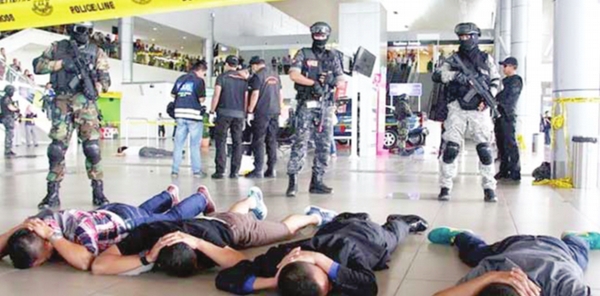Urban warfare training likely
Published on: Saturday, January 26, 2019
By: Zam Yusa

KOTA BELUD: The Armed Forces may include urban warfare as it has been identified as an aspect most lacking in the region.
Singapore is said to be the only Southeast Asian country with a coordinated capability between its army and air force to fight in an urban setting, a capability received the limelight following the 2017 Marawi war in the southern Philippines.
ADVERTISEMENT
Most armies are trained in conventional or jungle warfare except for their special forces who are also trained to fight in conflicts in cities and other heavily populated areas.
Malaysian Air Force Chief General Tan Sri Affendi Buang said in November 2017 that the service would introduce urban warfare to its capability in 2018 in the face of terrorism threats such as the Marawi city siege.
In January 2018, then-Malaysian armed forces chief General Tan Sri Raja Mohamed Affandi Noor said the military would study urban conflicts in other countries to strengthen their training and fighting doctrine as a lesson from the Marawi battle.
“Armed forces headquarters will issue an order for a joint-training for a period of four years focusing on current security threats including urban conflicts,” Malaysian army chief General Dato’ Seri Ahmad Hasbullah Mohd Nawawi told reporters, here, on Thursday.
ADVERTISEMENT
“Each defence service — army, air force and navy — will plan their own trainings based on the order from the armed forces chief.”
Ahmad Hasbullah said the armed forces chief had ordered an exercise slated for this October to test the preparedness of all the three military branches, a major exercise last made in 2012 that cost more than RM20 million.
ADVERTISEMENT
“The exercise will cover the whole spectrum of warfare for the army during the time given and if [urban warfare training is ordered], the army will include it,” said Ahmad Hasbullah.
“We are also planning an exercise for the army simultaneously in West and East Malaysia in conjunction with the 86th Army Day.
“I’m sure there’ll be lessons learned such as: is the training time enough, is the equipment still usable, is the technology the latest? Cyber [warfare will also be included], which will be interesting for the public to know.”
More than 1,200 people, mostly militants, were killed in Marawi city during the five-month long conflict between Philippine troops and the Islamic State (IS)-aligned Abu Sayyaf and Maute terror groups.
The Philippine military, mostly trained in conventional warfare, was said to have been inadequately prepared for the attacks by the militants which started in May 2017.
It was reported that they had to eventually get help from the United States and Australia before they could retake the city in late October 2017.
One of the problems faced by the Philippine military during the Marawi conflict was the friendly fire on ground troops by its air force.
In July 2017, at the height of the Marawi conflict, a Philippine air force plane dropped bombs meant for extremists but they killed 11 army troops and wounded seven others instead.
It was reported that the Philippine air force had not held a joint-urban warfare exercise with the army.
The attacks on the city came as a surprise to the Philippine defence forces who had been battling insurgencies for decades but mostly in a jungle setting.
The battle for the city with a majority Muslim population in the mainly Catholic Philippines even took longer than the time taken by the US-led campaign to liberate Manila from Japanese occupation forces in World War 2.
In the process, the military literally destroyed Marawi to save it from pro-IS gunmen who were intent on carving out territory for a Southeast Asian caliphate.
Military officials said the militants, who numbered about one thousand, brought in a new style of urban warfare that initially confused Filipino troops, forcing them to improvise.
“These terrorists are using combat tactics that we’ve seen in the Middle East,” then-US Pacific Command chief Admiral Harry Harris told a security forum in Singapore in October 2017.
Stay up-to-date by following Daily Express’s Telegram channel.
Daily Express Malaysia




